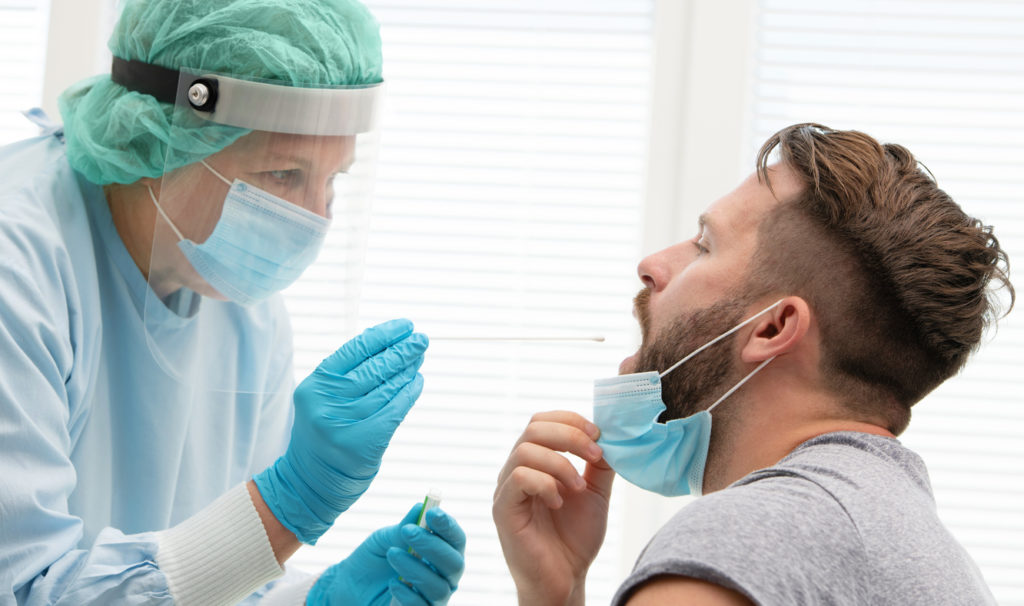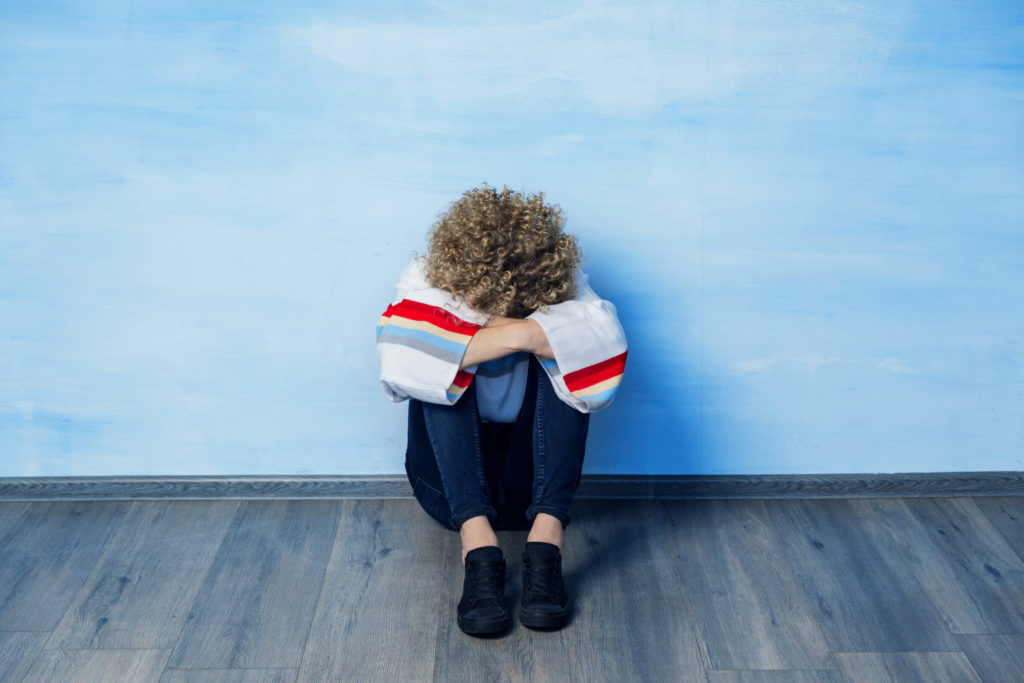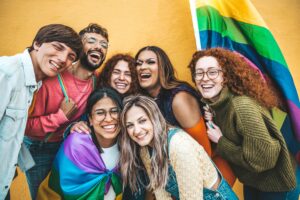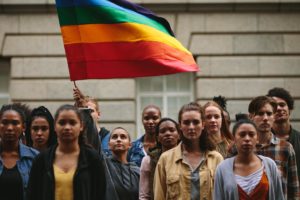COVID-19 affects us all, but not in the same way—and certainly not to the same degree. That’s especially true when talking about minority groups like LGBTQ people.
For many middle- and upper-class Americans, living through a pandemic has meant back-to-back Zoom meetings, gaining the “quarantine 15,” and wearing nothing but sweatpants.
While a year of working from home and avoiding social events is challenging, these complaints are minor compared to what marginalized groups have faced over the past year.
For example, Native Americans, African Americans, and Latinos are 3 times more likely than whites to be hospitalized for COVID-19. They’re also twice as likely to die from the disease. On top of that, they’ve experienced greater job losses and more evictions as a result of the pandemic.
Politicians and charities recognize that the pandemic has made vulnerable people even more vulnerable. That’s a good thing. But most research and aid has focused on racial and ethnic groups. Other minority groups, like LGBTQ people, have been largely ignored.
What little research has been done shows that LGBTQ people have been disproportionately impacted economically, physically, and mentally by the pandemic.
Economic Impact Of COVID-19 On LGBTQ People
Initial research shows that most countries are in a recession. Unemployment has reached record highs. And as many as 70% of Americans are struggling to make ends meet.
These statistics describe the economic impact of COVID-19 on the whole. But it’s not too much to suggest that LGBTQ people’s greater overall risk of poverty makes them more vulnerable to the economic fallout from the pandemic.
Indeed, one study found that 17% of LGBTQ Americans had lost their jobs due to COVID, compared to 13% of the general population. That could be because a greater proportion of LGBTQ people work in industries that have been hit harder by the pandemic, including food service and retail.
COVID-19 And LGBTQ Health

LGBTQ people are particularly vulnerable to developing serious complications from COVID-19. That’s due in large part to their heightened smoking rates, greater number of substance use disorders, and higher prevalence of chronic illnesses.
Smoking Rates
Over 20% of lesbian, gay, and bisexual adults report smoking cigarettes. Among transgender adults, 35.5% smoke. In the general population, only 14.9% of straight adults smoke. LGBTQ smoking rates are concerning because current or past smoking increases the risk of severe coronavirus disease.
Substance Use Disorders
More than a third of sexual minority adults (37.6%) reported past year marijuana use, compared to 16.2% in the general population. Past-year opioid use was also higher in the LGBTQ community (9%) than in the total population (3.8%).
Recent studies link SUDs to greater COVID risk. Concretely, those with a recent SUD diagnosis were more likely than those without to develop COVID-19. The strongest effects were related to opioid use disorder, followed by tobacco use disorder. In addition, individuals with a SUD diagnosis had a greater chance of experiencing more serious COVID-19 outcomes (e.g. hospitalization, death) than those without a SUD.
One possible explanation is that the lungs and the cardiovascular system are often weakened in people with SUDs. This makes them more sensitive to COVID-19 symptoms.
Another contributing factor is that people with addictions are often marginalized. As a result, they have a harder time accessing health care services. This is particularly true for LGBTQ people. One study found that 17% of LGBTQ adults don’t have any kind of health insurance coverage, compared to 12% of non-LGBTQ adults.
Chronic Illnesses
In addition to showing higher rates of smoking and substance use, LGBTQ individuals have a higher prevalence of chronic illnesses. In particular, they have higher rates of asthma, diabetes, eating disorders, and HIV.
While studies are preliminary, initial findings suggest these conditions make individuals more susceptible to severe COVID-19 illness.

COVID-19 And LGBTQ Mental Health
Even before the pandemic LGBTQ people reported mental health problems 2.5 times more frequently than their heterosexual peers. This is due to the combination of minority stress, discrimination, and stigma that comes from being a part of a marginalized group. As the pandemic continues, LGBTQ people are reporting even more mental health challenges.
Pre-pandemic, community centers, schools, and clubs provided safe spaces for LGBTQ people to socialize and access mental health services. Now that these services have moved online or have closed entirely, LGBTQ people are often left to their own devices. As a result, LGBTQ individuals report feeling more isolated, depressed, and anxious since the pandemic started.
In particular, LGBTQ people aged 50+ and LGBTQ adolescents are having an especially difficult time coping with the pandemic.
Older LGBTQ People
Older LGBTQ people are suffering more from COVI-19 for several reasons. For one, this group has experienced more severe systemic discrimination in housing, education, and job opportunities than younger LGBTQ people have. Not surprisingly, this puts them at a greater risk for living in poverty.
As if this weren’t bad enough, older LGBTQ people report more familial rejection. Compared to their heterosexual counterparts, they’re twice as likely to live alone, and four times less likely to have children. In many cases, this leads to isolation, loneliness, and depression.
The combination of poverty, familial rejection, and isolation means that older LGBTQ people have little to no safety net to fall back on during the pandemic. It also means more difficult access to treatment and support they develop a COVID-19 infection.
Adolescents
Even before COVID-19, LGBTQ youth were at a higher risk for depression, suicide, and substance use. That’s because LGBTQ people face high rates of rejection, discriminization, and victimization from family members, peers, and society at large.
For some, familial rejection means homelessness or housing precarity. Indeed, LGBTQ youth are 120% more likely to experience homelessness than their heterosexual peers. For LGBTQ youth in this group, public schools and child welfare agencies often provide food, clothing, and other resources. However, COVID-related closures have meant a loss of access to these critical resources.
Closures also mean a loss of access to friends, supportive adults, and safe spaces. Without them, LGBTQ youth have little to no support and must shoulder mental health burdens alone. In fact, one study found that 40% of young LGBTQ people reported feeling isolated during the pandemic, while 26% reported a lack of social or emotional support in their daily lives.
What La Fuente Is Doing To Stay COVID-Safe
At La Fuente Hollywood Treatment Center, we’re doing everything we can to keep our clients and staff safe.
To this end, we require masks for all staff and patients, regardless of their testing or vaccination status. We’re also testing all incoming clients and have implemented quarantine protocols as needed. Finally, we’ve moved all of our intensive outpatient care online.
We know how challenging this time is, especially for those struggling with alcohol and substance abuse. That’s why we’re doing everything we can to provide exceptional LGBTQ-affirmative substance abuse treatment during the pandemic and beyond.
If you’d like to talk to us about LGBTQ-affirmative treatment in Los Angeles, California, complete the form below. A member of our staff will contact you within 24 hours to discuss your treatment options.





